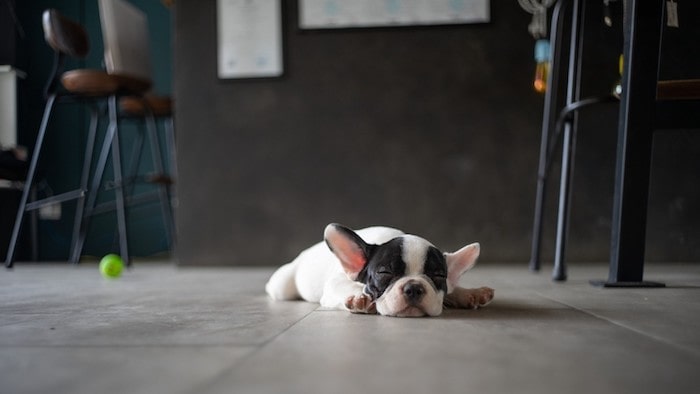Do you ever catch your furry best friend curled up on the floor, snoozing away? As pet parents, it’s natural to notice changes in our dog’s behavior, and where they choose to rest their sleepy paws is no exception.
But what does it mean when your dog suddenly decides to ditch their comfy bed for the cool, hard floor? Fear not, fellow pup lovers, because we’re here to dig deeper into this puzzling pooch behavior.

We’re going to explore all the reasons why your furry companion may be opting for the floor nap life, from cozy comfort preferences to potential health concerns.
So, let’s dive into why your dog may be forgoing their bed for the floor and learn how to keep them happy, healthy, and snoozing soundly.
Possible Reasons Why a Dog Might Sleep on the Floor
There are several reasons why a dog might suddenly start sleeping on the floor instead of their bed or other cozy spot. Here are some of the most common explanations for this behavior:

- Comfort and Temperature: Dogs are sensitive to changes in temperature and often prefer sleeping on cooler surfaces during hot weather. Additionally, a dog’s bed or sleeping surface may not be comfortable enough for them, especially if it’s too small, too soft, or too hard. If your dog has joint pain or arthritis, they may also prefer the firm support of a hard floor over a soft bed.
- Health Issues: Certain health issues can cause dogs to sleep on the floor. For example, a dog with a fever may feel more comfortable on a cooler surface, while a dog with an upset stomach may prefer the stability of a hard floor. Dental problems, like toothaches or gum disease, can also make it uncomfortable for dogs to rest their heads on a pillow or other soft surface.
- Anxiety and Stress: Dogs that are anxious or stressed may prefer to sleep on the floor, as it allows them to be more aware of their surroundings and feel more in control. Additionally, dogs with separation anxiety may choose to sleep near the door or in a location where they can keep an eye on their owner.
- Changes in the Environment: Dogs are creatures of habit, and changes in their environment can cause them to feel anxious or stressed. Moving to a new home, rearranging furniture, or introducing new pets or family members can all be reasons why a dog might start sleeping on the floor.
- Aging: As dogs age, they may develop mobility issues or joint pain, which can make it difficult for them to climb onto a bed or other elevated surface. In these cases, sleeping on the floor may be a more comfortable and accessible option.
Dangers of Sleeping on the Floor
While sleeping on the floor may seem like a harmless behavior, there are actually some potential dangers that pet owners should be aware of. Here are some of the risks of dogs sleeping on the floor:

- Cold and Hard Surfaces: Sleeping on a hard floor can put pressure on a dog’s joints and lead to stiffness or pain, especially in older dogs or those with existing joint problems. Additionally, sleeping on a cold floor can make it harder for a dog to regulate their body temperature and may lead to hypothermia or other health issues.
- Exposure to Allergens: Dogs that sleep on the floor may be exposed to dust, dirt, and other allergens that can irritate their skin or respiratory system. This can be especially problematic for dogs with allergies or respiratory issues, as well as those with light-colored coats that show dirt easily.
- Increased Risk of Parasites: Dogs that sleep on the floor may be at a higher risk of picking up parasites like fleas, ticks, or mites. These pests can cause discomfort and health problems for dogs, as well as infest homes and other pets.
- Behavioral Issues: Sleeping on the floor can be a sign of stress or anxiety in dogs, and may be a symptom of behavioral issues like separation anxiety or fear of loud noises. Addressing these underlying issues can help prevent more serious behavioral problems down the line.
What to Do If Your Dog Is Suddenly Sleeping on the Floor
If you’ve noticed that your furry friend is suddenly sleeping on the floor instead of their bed or other usual sleeping spots, there are a few things you can do to address the behavior and ensure your dog stays comfortable and healthy. Here are some tips to keep in mind:

- Rule Out Health Issues: Ruling out any underlying health issues that may be causing your dog to prefer the floor, begin by taking your pet to the vet for a check-up.
- Evaluate Sleeping Arrangements: Examine your dog’s sleeping area and ensure the bed is suitable for their size and age. If your pup has any mobility difficulties or joint pains, you may want to purchase a bed that makes it easier for them to enter/exit.
- Address Anxiety and Stress: In order to assist your dog if they are sleeping on the floor due to anxiety or stress, ensure that they get ample exercise and mental stimulation throughout their day. You can also attempt to use calming aids such as pheromone diffusers or soothing music.
- Provide a Cozy Alternative: Depending on the season, if your dog is sleeping on the floor because of temperature preferences, consider providing a comfortable alternative such as a cooling mat or heated bed.
- Keep the Floor Clean: It’s essential to keep the area clean and free from allergens and pests if your dog is sleeping on the floor. Therefore, vacuum and dust regularly, as well as consider using pet-safe cleaning products in order to maintain a healthy home environment for both you and your furry friend.
FAQs
Yes, it’s not unusual for dogs to sleep on the floor. However, sudden changes in sleeping behavior should be monitored and evaluated to ensure your dog is healthy and comfortable.
Make sure your dog’s bed is the appropriate size and material for their needs, and consider adding extra cushioning or supportive padding to help them feel more comfortable. You can also try placing the bed in a quiet, cozy location away from any distractions or noise.
While it’s not necessarily a cause for concern, sudden changes in behavior should be monitored and evaluated to ensure your dog is healthy and comfortable. If your dog’s sleeping habits change suddenly or persist over time, it may be worth checking in with your vet to rule out any underlying health issues.
It’s a good idea to clean your dog’s sleeping area at least once a week, and more often if they are shedding excessively or prone to allergies. Be sure to use pet-safe cleaning products and regularly wash any bedding or blankets to keep your dog’s sleeping area clean and hygienic.
Like our passion for dogs, DogLikesBest is dedicated to providing valuable insights and tips for dog lovers everywhere.
Conclusion
In conclusion, there are many potential reasons why your dog might suddenly start sleeping on the floor, ranging from health issues to anxiety or temperature preferences. While sleeping on the floor is not necessarily dangerous for dogs, it’s important to monitor your dog’s behavior and evaluate any sudden changes to ensure they are healthy and comfortable.
By providing your dog with a comfortable and supportive sleeping area, addressing any potential health issues or sources of stress, and using positive reinforcement training to encourage desired behavior, you can help your dog feel safe, comfortable, and happy at rest. If you have any concerns about your dog’s sleeping habits or overall health, don’t hesitate to consult with your veterinarian for advice and guidance.

Ellis is a retired veterinary technician and full-time contributor at DogLovesBest. He likes writing about pet health care tips and reviews the products that are useful for fidos on a daily basis.
Ellis also guardians a Siberian husky, Nova, and a cat named Shilly. They all live happily with his wife Ammy, and both the dogs on a seaside apartment in Queens, NY.
